SCIENCE AND PUBLIC APPLAUSE.
IS public homage of the kind which is being paid this week to Professor Virchow—homage such is reserved, as a rule, for great statesmen or great Generals—good for science or good for the world in general ? That is a question which must have struck hundreds of minds in reading the telegrams from Berlin which appeared in Wednesday's papers. Tuesday was Professor Virchow's seventieth birthday, and in honour of the eminent pathologist, the whole German Press contained articles commenting on the occasion as an anniversary of great popular interest, while what is described as " a national ovation " took place in the hall of the Kaiserhof Hotel. The Professor was accorded " a place of honour " at the top of the hall, the body
of which was crowded with the " professors, academicians, and men of science from all parts of Europe" who had joined the deputations charged with the duty of presenting addresses of congratulation. Nor was this all. " At the conclusion of the ceremony in the Kaiserhof Hotel, a second meeting was held in the large ball of the Patho- logical Institute. Here an almost endless procession of learned bodies and other corporations, presenting gifts and addresses, defiled before Professor Virchow." That Professor Virchow well deserved the honours accorded to him by the medical profession throughout the world and by the German public, we do not wish to appear to doubt for a moment. Universal consent accords him a high place among those who have helped to lift the burden of disease from mankind. What we do desire to ask is, whether the new tendency to make popular heroes of men of science is on the whole a good one To begin with, one thing is clear,—it will alter the class of men who undertake scientific research as their career in life. Up till now, the men who have devoted themselves to abstract science have generally done so from pare love of the pursuit of knowledge. They have not been attracted to science by the hope of satisfying an ambition for a great position before the world, for hitherto that has not been offered to them. When Dr. Joule began investigations which ended in the enunciation of as great a scientific truth as that discovered by Newton in the law of gravitation, he had no thought of popular ovations and articles in the newspapers as the reward of success ; nor did he, in fact, earn anything which could by any possibility be called popularity. The result of this has been that till within the last few years, those bent on satisfying mere worldly ambition have struck the idea of a scientific career out of their calculations. Thus, in a great measure, men of science have been persons who have proved their indifference to worldly considerations, and their love of knowledge for its own sake. It would be impossible not to feel a keen sense of regret if this fine temper of mind should cease to be the distinguishing mark of the man of science. Yet cease it must, we fear, if the am• bitious youth with his career to choose can say of science : ' Here is a field in which I can exchange my brains and my assiduity against popularity and worldly position with great advantage.' Under such conditions, men will go into science as they go into business, into politics, into the Army, —for a career. It may be said, perhaps, that this does not greatly matter, because, though a certain number of men will take up the pursuit of scientific truth from worldly motives, there will still remain plenty of others who will adopt it on the old grounds. That, no doubt, is true ; but our fears as to the ultimate result remain unshaken. And for this reason. The worldly-minded men who have taken up science as a means of making fame and money will lower the whole tone of the scientific world. Since not the advancement of human know- ledge, but the pursuit of personal advantage will be their aim, they will have no intellectual ideal, but, instead, a purely materialistic outlook. But nothing is more contagious than this spirit. The temptations to men to give up the pursuit of beauty in art, of truth in philosophy, or of knowledge in science, are always in existence, and those who have dedicated them- selves to these ideals are always being pressed by the weight of circumstances to desert the austerity of•the clear mountain heights of unselfish endeavour, for the fat plains and valleys of the material world. But if, in addition to these temptations, they are surrounded by those whose patent object is worldly advancement, and who are merely mating science an instru- ment with which to gain success, the difficulty of resistance becomes infinitely greater. If practically the whole body of workers in a particular field of research profess to be indifferent to worldly considerations, a high tone of feeling may be maintained,—a tone which is always ready to strengthen the weak. If, however, an ideal is not even professed, the general sentiment soon becomes degraded, and not "More light," but "More opportunities for winning fame and fortune," becomes the watchword. The men who are attracted into science by worldly motives are, in a word, pretty sure to degrade the tone of its followers. Nor is this all. There is yet another grave objection to anything which attracts persons primarily actuated by worldly motives to take up scientific research. Though we are perfectly willing to admit the great benefits which science has conferred upon the world, and to admit, too, how powerful has been its aid in raising the standard of
civilisation, it is impossible not to recognise that science is capable of exercising a maleficent as well as a beneficent influence. It can and does do a great deal of good to mankind, but it may also do a great deal of harm. For example, men have been enabled by science to bridge rivers and tunnel under mountains which in former times were only passed with the greatest difficulty, but they have also been enabled to destroy those bridges and tunnels with far greater ease than before. Ancient conquerors, in spite of all their efforts, could not succeed in utterly destroying the cities and countries given over by them to destruction. A modern tyrant, were he to desire it, might literally level London to the ground with dynamite, having first poisoned all its inhabitants by exploding bombs in the streets, charged with gases so poisonous and se capable of expansion as to render large tracts of air utterly inimical to human life. As a rule, science turns itself away from producing what is not useful but injurious, and concen- trates its attention on what is likely to benefit mankind. It helps, of course, to make war inventions more effective, but no scientific man has yet persistently searched for means of destroying non-combatants wholesale, or for sterilising vast tracts of country as a lava-flood sterilises them. If once, however, the tone of scientific feeling is lowered, there is no knowing how far the maleficent side of science may be developed. Suppose it was known that only one link were required for the rapid and wholesale production of an air-poison so potent as to act instantaneously over a very wide area. No great scientific man of the type now in existence would think of devoting himself to finding that link in the method of preparation,—unless, of course, some great abstract scientific problem were involved. The sense that they have distinct duties to perform to the race which is apparent in men of science as we know them, would forbid their giving years of labour to perfect a process for producing a lethal gas which could have no useful function, and might be employed to destroy life wholesale. But should we have the same guarantee for this sentiment if half the men of science were primarily anxious to sell their powers over Nature to the highest bidder F The results of scientific discoveries intended to be beneficial are often, as it is, turned to very ill uses. What would be the result if we had hundreds of active brains con• sciously attempting to shape Nature's actions to evil ends P
But though we are anxious that the best interests of science should not be endangered by too great popular homage, we do not fall into the error of thinking that science should be neglected or left out in the cold. We fully acknow- ledge that the manner in which science was treated by the Church and by public opinion in general during the Middle Ages, produced even worse evils than those we dread if the modern tendency is persisted in. By distrusting science, the medieval world produced the alchemist, and the apothecary whose trade was in truth that of a poisoner. The men who follow science faithfully and single heartedly are working for good, and not for evil. Mankind, however, must not forget that to pursue knowledge infinite " creates a trust. The men of science are trustees of the world's secrets for the use of mankind. But if this is so, we want our trustees to be trustworthy men. It follows, then, that we must do nothing to attract men to take up the trust who are not fitted for its due
discharge. But if we offer the bribes of applause and popu-
larity, we are in danger of doing this—that is, of bribing men to accept a vocation which is not their own. It will, we cannot help thinking, be better for mankind if the men of science are not decoyed down from the sun-crowned heights of abstract knowledge, and encouraged to join in the scramble for worldly honour and worldly success.



































 Previous page
Previous page